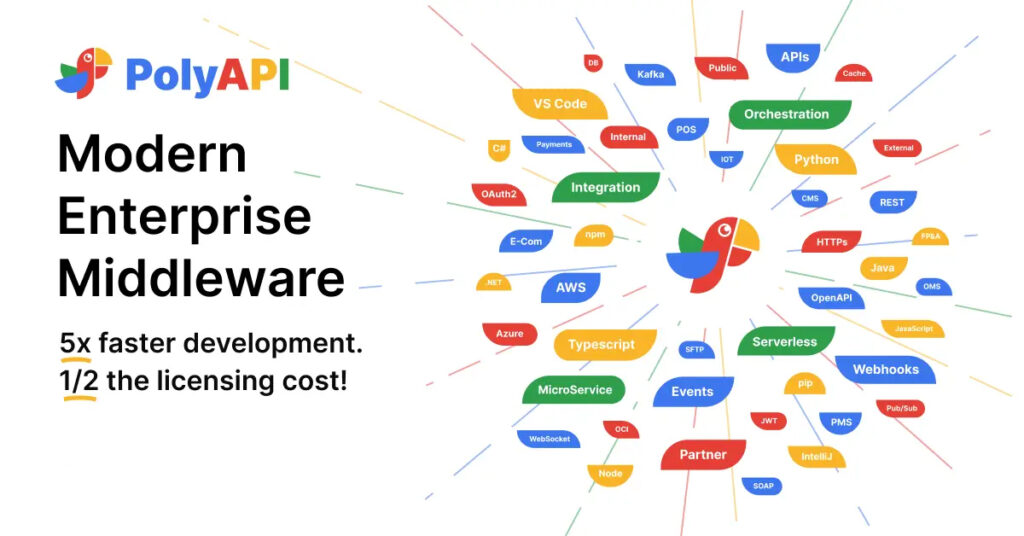Businesses rely on complex integrations, orchestrations, and microservices to stay competitive. Developing, maintaining, and scaling these systems comes with challenges such as managing dependencies and data consistency, operational visibility across services, scalability of services, and cost effectiveness of platform and infrastructure. PolyAPI addresses these challenges by providing a unified platform designed to seamlessly build and operate integrations, orchestrations, and microservices, empowering development teams to develop quickly and operate efficiently.
Here’s how PolyAPI helps simplify and enhance this process:
Catalog: Organize and Preserve Institutional Knowledge
One of the critical challenges enterprise development teams face is managing and retaining institutional knowledge—essential technical information about the APIs and events they use or have available within their systems. This knowledge includes enumerating and discovering API operations, their respective arguments and response schemas, and how they are used and integrated across different services and workflows. Maintaining this knowledge is traditionally challenging because it often resides in scattered documentation, locally on developers’ computers, outdated wikis, or inside developers’ minds, making it difficult to reuse and keep updated. As APIs and events evolve, manual updates to documentation become inconsistent and error-prone, leading to gaps in understanding or, worse, total institutional knowledge loss as developers move to different roles.
The PolyAPI platform catalogs APIs and events as reusable functions either by observing API calls through Postman or ingesting OpenAPI specifications. Any missing details, such as API names, descriptions, argument details, and return type schemas, are automatically generated by Poly’s AI. This results in a comprehensive and structured classification of each API, ensuring that teams always have access to accurate, up-to-date documentation across time. Developers can also manually review and edit the generated schemas and descriptions, giving them full control over accuracy and completeness. This ensures that organizations can effectively manage their integration dependencies, making them well-documented, easily accessible, and fully aligned with their systems’ requirements.
Looking ahead, Poly is focused on further enhancing these capabilities by developing services that post-process production traffic, ensuring that API models remain accurate as the underlying systems evolve. A streamlined set of tools is also in progress to share and promote updated information across different organizational environments, ensuring teams remain aligned and informed as integrations scale and adapt.
Develop: Accelerating Development with GeneratedSDKs & AI Assistance
Within the IDE, developers benefit from IntelliSense, which provides real-time contextual code insights, streamlining the development process by displaying relevant functions, objects, and their expected parameters. This makes it easier to understand how APIs interact and also helps prevent common coding errors by enforcing type safety. Given that development is native, developers can leverage their preferred CI/CD pipelines and source management processes and tooling. Additionally, developers can securely inject configuration values, API keys, and credentials using Vari, enhancing both security and performance by ensuring sensitive data is managed safely without being exposed in the codebase.
Poly’s AI Assistant, when prompted, uses the catalog metadata through a RAG-based process to assist in function discovery for trained APIs and event handlers, providing generated code examples that demonstrate how to use them. This accelerates development by giving developers immediate guidance on integrating key functionalities. Since the AI Assistant is leveraging the Poly catalog, it can generate much better and more accurate examples relevant to the services the developer has available to work with. Looking ahead, Poly aims to use the catalog information to detect type safety violations at runtime and to proactively bring those to the attention of integration owners, ensuring that as the underlying APIs evolve, integrations remain up to date and running. Poly also aims to level up the coding assistant to allow for support in architecting and implementing complex integration logic much more quickly than is possible today.
Operate & Manage with Ease: Operational Visibility
Poly offers flexible deployment options due to architectural decisions to align with native development. Users can either deploy integrations as native apps in their runtime of choice, where Poly is an imported library, or as serverless functions running on Poly’s scalable runtime.
Once deployed, maintaining real-time visibility into integrations, orchestrations, and microservices ensures reliability and performance. Poly provides comprehensive dashboards that offer a granular view of server functions (integrations, orchestrations, or microservices): resource consumption, consumption information, and key metadata. These dashboards enable teams to proactively monitor performance and spot potential issues before they become problems.
For deeper insights, Poly offers runtime operational logs that capture events, actions, and errors during execution. These logs, available through the PolyUI, provide vital information for troubleshooting and debugging, allowing developers to locate the issue’s source quickly. This operational oversight helps developers and operations teams resolve problems quickly, minimizing downtime and ensuring systems run smoothly at scale.
Poly’s error handler module automatically captures errors within single or multiple functions, ensuring that issues are promptly detected. These errors can then be subscribed to and processed programmatically within the service itself, by a dedicated monitoring service, or by other Poly server functions. This level of operational oversight ensures reliable performance across systems, providing flexibility in managing and addressing errors.
Conclusion: A Smarter Way to Manage Development Lifecycles
PolyAPI is a full-lifecycle development platform for creating, managing, and deploying integrations, orchestrations, and microservices. From automating API cataloging and providing robust SDKs for development to offering powerful monitoring and error-handling tools, Poly equips developers with everything needed to build, deploy, and operate successfully in today’s landscape.
Poly’s key business benefits enable faster development, broader use of existing talent without needing niche expertise, and seamless integration with current DevOps tools by simplifying complex processes and providing deep operational insights. Organizations benefit from predictable, transparent pricing while leveraging open-source technologies to reduce costs and avoid proprietary limitations. These advantages help businesses stay agile, drive innovation, and confidently scale their systems efficiently and cost-effectively. If you would like to learn more, reach out to hello@polyapi.io and we would love to connect with you.
